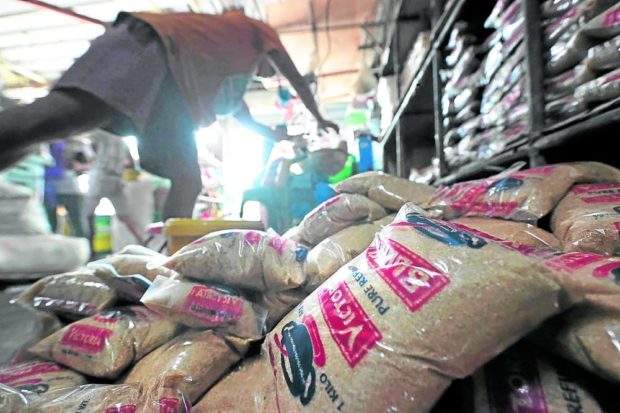‘Sugar shortage to test Marcos admin’s mettle’

A worker repacks sugar at a Visayas Avenue public market. Economists are watching Malacañang’s response to the crisis to divine its approach to future challenges. —GRIG C. MONTEGRANDE
A recent policy flip-flop on sugar importation is the “first major misstep” of the Marcos administration as the sugar crisis continues to test the mettle of the new President in making sound economic policy decisions, according to New York-based think tank Global Source.
In a research note dated Aug. 25, Global Source economists Romeo Bernardo and Marie Christine Tang said President Marcos has chosen good people in his Cabinet, valuing competence and integrity over personal ties.
“Then, he lent credibility to his economic team, opening his first policy speech to Congress with their growth and development goals and importantly for credit markets, the medium-term fiscal consolidation program, and then said all the right things in the rest of the speech,” the think tank said.
And to signal that he is “neither populist nor beholden to anyone,” Global Source noted that Mr. Marcos had vetoed three bills, including those that benefited business groups that were reputedly major sponsors of his campaign.
“His continuing silence on the popular policies he espoused on the campaign trail, notably P20 rice and an oil price stabilization fund, as well as his and the economic managers’ active engagement with the business sector further bolstered beliefs that the economic team has his ear,” the research said.
Article continues after this advertisementBold … or ill-advised
However, Global Source raised concern on how the administration is handling the sugar crisis, particularly the flip-flopping on the importation of sugar. To recall, the President appointed himself Agriculture Secretary in June, which the think tank said was “either a bold move or an ill-advised one.”
Article continues after this advertisementA government-owned corporation, the Sugar Regulatory Administration (SRA) not only controls domestic supply through imports but decides how much of local production will be allocated to meeting US quotas and domestic consumption needs.
“This central planning system, coupled with the sector’s relatively poorer productivity, has translated into comparatively high domestic sugar prices, as much as twice the world market price in the past 10 years,” the research said.
Recently, Malacañang recalled an order to import 300,000 metric tons of sugar signed by members of the SRA board, citing the order as “illegal.” The President has since then agreed to import sugar at half the original volume and at a later date.
“The question is, is this decision based on sound economics or political accommodations? So far, retail prices of sugar are unchanged despite reports of large supermarkets having been persuaded to sell the product at a discount. Another worrying sign is the suspension of operation in some plants of a large multinational beverage manufacturer reportedly due to lack of sugar,” Global Source said.
“We are not quite sure what this seeming first major misstep means, but it is being closely watched as possible canary in the coal mine,” it added.
Policy tug of war
The think tank noted that, throughout the country’s presidential history, including the first Marcos administration, there have been tugs of war between economic technocrats and the more politically oriented advisers, driven by short term popularity, power consolidation or fund-raising agenda.
“How this administration, and thus our economy, fares over its entire term, amid all the daunting economic challenges, may well depend on who the President listens to,” the research said.
In the case of the controversial order to import 300,000 tons of sugar, Leocadio Sebastian, an agriculture undersecretary who was designated ex-officio chair representing the President, signed the order on behalf of Mr. Marcos.
“Many thought that what transpired soon after was tantamount to the President and his Palace team throwing a highly-regarded technocrat under the bus,” it said.
Through his spokesperson, the President disavowed knowledge of the importation order, after which his executive secretary told a senate hearing that while he had the importation order drafted, he had expected the undersecretary to get the President’s approval first before signing.
Sebastian has since then quit his post. INQ